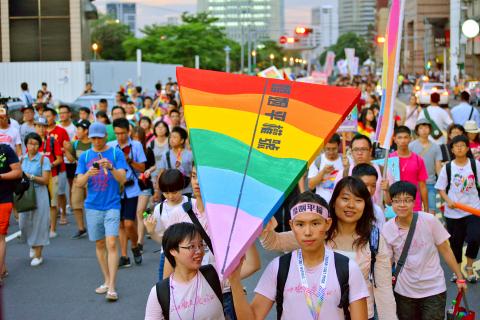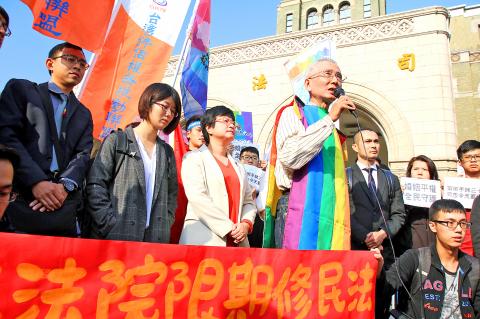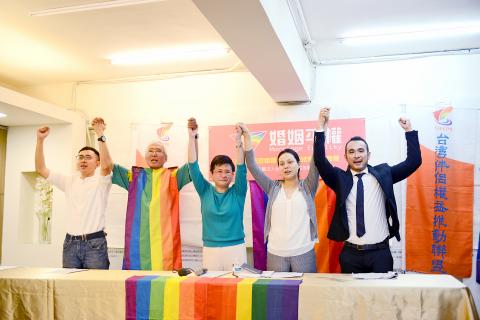As tens of thousands cheered in May last year when the same-sex marriage ban was ruled unconstitutional, Jennifer Lu (呂欣潔) knew that the battle was far from over.
“I didn’t feel happy or excited because we still needed to go back to the legislature and make them pass the bill we want,” says Lu, who is coordinator of the Marriage Equality Coalition (MEC). “The ruling was an amazing moment for the LGBT movement in Taiwan, but as a leader of the campaign, I was quite worried about people losing their motivation to continue.”
Lu’s concerns have proved prescient. The Council of Grand Justices gave the legislature two years to legalize same-sex marriage — either to amend the Civil Code’s gendered language, as LGBTQ activists prefer, or to create a separate same-sex civil partnership law.

Photo courtesy of the Taiwan Alliance to Promote Civil Partnership Rights
However, in April, the Central Election Commission approved three referendum proposals from anti-LGBTQ organizations that, if passed, could create a separate law for same-sex couples, restrict the definition of marriage in the Civil Code to unions between men and women and eliminate education about homosexuality for younger students.
Creating a law specifically for same-sex couples rather than removing gendered language from the Civil Code would deny gay people the title of “marriage,” implying that it is distinct from heterosexual partnerships. If the separate law is not identical to the Civil Code, activists fear they will need years of additional litigation to achieve the same rights.
As anti-LGBTQ organizations rush to gather the 281,745 signatures needed by the end of this month for the proposals to coincide with the November municipal elections, marriage equality activists face difficulties mobilizing opposition.

Photo courtesy of the Taiwan Alliance to Promote Civil Partnership Rights
LOW ‘CRISIS AWARENESS’
Paowuchien (拋物線), a pseudonym for founder of LGBTQ organization Rainbow Boulevard, says “people lack crisis awareness.”
Paowuchien cites as an example a gay cafe owner with whom she wanted to collaborate to petition the government to revise the Civil Code.

Photo courtesy of the Taiwan Alliance to Promote Civil Partnership Rights
“Why do we have to do this? Hasn’t it already passed?” he asked her.
Huang Hsin-yi (黃馨儀), a MEC volunteer, says momentum remains low.
“People are waiting to get married, and people think, ‘Yes, we can get married already,’” Huang says.
LGBTQ activists contrast the lack of awareness with a strong anti-gay movement that lobbies politicians effectively.
“Gay people are not visible. You don’t know where they are,” Taiwan Alliance to Promote Civil Partnership Rights secretary-general Chien Chih-chieh (簡至潔) says. “Churches are well-organized, gay people are not. Churches give campaign donations, gay people don’t.”
Chien sees this vocal opposition as one source of legislators’ reluctance to openly support amending the Civil Code, with most maintaining neutrality in the lead-up to the referendum — and the municipal elections. It’s also why same-sex marriage activists are annoyed that Premier William Lai (賴清德) continues to drag his feet in drafting a same-sex marriage proposal, even though he promised one by the end of last year.
Indeed, there was a campaign last year to recall New Power Party (NPP) Executive Chairman Huang Kuo-chang (黃國昌) after he voiced support for same-sex marriage. Though it failed, 48,693 constituents voted in favor of recalling Huang, while less than half that number — 21,748 — voted against it. Huang’s detractors needed to cast at least 63,888 “yes” votes.
For marriage equality activists, the potential political ramifications of the referendum proposals are more significant than the success or failure, as legislators use them to gauge public support.
“If they get a lot of votes, then the government will choose not to revise the Civil Code, and maybe they will give us a separate bill,” Chien says.
LEGAL CONFUSIONS
Cora Lee (李欣宜) occasionally accompanies friends to LGBTQ events, but is unsure what the referendum proposals mean. When the anti-LGBTQ proposals were approved, she didn’t think they would affect her because she was not considering marriage.
“Even if society accepts gay people, if my parents won’t accept me, then it doesn’t change my life,” Lee says.
Chang Xin-yu (張欣渝) says the proposals are somewhat confusing.
“The wording of the proposals are deliberately complicated, to make people unable to understand it,” she says, citing confusion over legal technicalities to explain widespread indifference to the referendum proposals. “I have a lot of friends who think if marriage equality happens, it’s fine, regardless of whether it’s a separate law or a modification of the Civil Code.”
When Flora Yang (楊彤玉) describes her indignant reaction to the proposals, she says that the lack of understanding between creating a separate law and revising the Civil Code disadvantages marriage equality activists.
“If supporters of marriage equality don’t disseminate easily understandable information, those who agree with same-sex marriage may end up supporting a separate law,” she says.
NORMALIZING MARRIAGE EQUALITY
The MEC believes that to turn the anti-LGBTQ referendum proposals in favor of the “no” campaign, activists need a new tactic, beyond rallies, protests and anger: conversation.
This strategy puts ordinary citizens on the front lines, relying on people like Chang, who recalls countering misinformation about homosexuality within her LINE group chat in 2016, when the Council of Grand Justices was studying the marriage equality case.
“Some people just need to see that you are normal, and not so different from them,” she says.
Yet, if many members of the gay community do not get the word out, same-sex marriage activists face an uphill climb.
“We need to educate our supporters to calm down, don’t get angry,” Lu says. “Don’t fight the opposition, your parents or your relatives. Try to deliver the right information.”

Towering high above Taiwan’s capital city at 508 meters, Taipei 101 dominates the skyline. The earthquake-proof skyscraper of steel and glass has captured the imagination of professional rock climber Alex Honnold for more than a decade. Tomorrow morning, he will climb it in his signature free solo style — without ropes or protective equipment. And Netflix will broadcast it — live. The event’s announcement has drawn both excitement and trepidation, as well as some concerns over the ethical implications of attempting such a high-risk endeavor on live broadcast. Many have questioned Honnold’s desire to continues his free-solo climbs now that he’s a

As Taiwan’s second most populous city, Taichung looms large in the electoral map. Taiwanese political commentators describe it — along with neighboring Changhua County — as Taiwan’s “swing states” (搖擺州), which is a curious direct borrowing from American election terminology. In the early post-Martial Law era, Taichung was referred to as a “desert of democracy” because while the Democratic Progressive Party (DPP) was winning elections in the north and south, Taichung remained staunchly loyal to the Chinese Nationalist Party (KMT). That changed over time, but in both Changhua and Taichung, the DPP still suffers from a “one-term curse,” with the

Lines between cop and criminal get murky in Joe Carnahan’s The Rip, a crime thriller set across one foggy Miami night, starring Matt Damon and Ben Affleck. Damon and Affleck, of course, are so closely associated with Boston — most recently they produced the 2024 heist movie The Instigators there — that a detour to South Florida puts them, a little awkwardly, in an entirely different movie landscape. This is Miami Vice territory or Elmore Leonard Land, not Southie or The Town. In The Rip, they play Miami narcotics officers who come upon a cartel stash house that Lt. Dane Dumars (Damon)

Today Taiwanese accept as legitimate government control of many aspects of land use. That legitimacy hides in plain sight the way the system of authoritarian land grabs that favored big firms in the developmentalist era has given way to a government land grab system that favors big developers in the modern democratic era. Articles 142 and 143 of the Republic of China (ROC) Constitution form the basis of that control. They incorporate the thinking of Sun Yat-sen (孫逸仙) in considering the problems of land in China. Article 143 states: “All land within the territory of the Republic of China shall